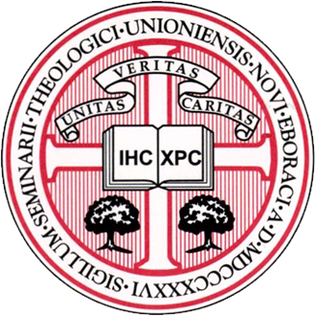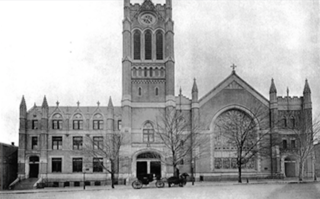Related Research Articles

Lyman Beecher was a Presbyterian minister, and the father of 13 children, many of whom became writers or ministers, including Harriet Beecher Stowe, Henry Ward Beecher, Charles Beecher, Edward Beecher, Isabella Beecher Hooker, Catharine Beecher, and Thomas K. Beecher.

Union Theological Seminary in the City of New York is a private ecumenical liberal Christian seminary in Morningside Heights, Manhattan, affiliated with Columbia University. Columbia University lists UTS among its affiliate schools, alongside Barnard College and Teachers College. Since 1928, the seminary has served as Columbia's constituent faculty of theology. In 1964, UTS also established an affiliation with the neighboring Jewish Theological Seminary of America. Despite its affiliation with Columbia University, UTS is an independent institution with its own administration and Board of Trustees. UTS confers the following degrees: Master of Divinity (MDiv), Master of Divinity & Social Work dual degree (MDSW), Master of Arts in religion (MAR), Master of Arts in Social Justice (MASJ), Master of Sacred Theology (STM), Doctor of Ministry (DMin), and Doctor of Philosophy (PhD).

Eden Theological Seminary is a Christian seminary based in Webster Groves, Missouri. It is one of the six official seminaries of the United Church of Christ (UCC).

Covenant Theological Seminary, informally called Covenant Seminary, is the denominational seminary of the Presbyterian Church in America (PCA). Located in Creve Coeur, Missouri, it trains people to work as leaders in church positions and elsewhere, especially as pastors, missionaries, and counselors. It does not require all students to be members of the PCA, but it is bound to promote the teachings of its denomination. Faculty must subscribe to the system of biblical doctrine outlined in the Westminster Standards.
The New Covenant Presbyterian Church is a congregation of the Presbyterian Church (USA) in the Liberty City neighborhood of Miami, Florida. It is significant for being the first Southern congregation in the Presbyterian Church (USA) to break racial barriers.

The Covenant First Presbyterian Church is a congregation of the Presbyterian Church (USA) located at 717 Elm Street at Eighth Street and Garfield Place in Cincinnati, Ohio. Two churches, the First Presbyterian and Covenant Presbyterian merged in the 1933 to become the Covenant First Presbyterian Church.
Otis Moss III is the pastor of Chicago's Trinity United Church of Christ. He espouses black theology and speaks about reaching inner-city black youth.

Fifth Avenue Presbyterian Church is a Presbyterian Church (U.S.A.) church in New York City. The church, on Fifth Avenue at 7 West 55th Street in Midtown Manhattan, has approximately 2,200 members and is one of the larger PCUSA congregations. The church, founded in 1808 as the Cedar Street Presbyterian Church, has been at this site since 1875.
Since 1937, the United States presidential inauguration has included one or more prayers given by members of the clergy. Since 1933 an associated prayer service either public or private attended by the president-elect has often taken place on the morning of the day. At times a major public or broadcast prayer service takes place after the main ceremony most recently on the next day.
West Presbyterian Church was a congregation and two houses of worship in Manhattan, New York City. The congregation was founded in 1829 and merged in 1911 with Park Presbyterian Church to form West-Park Presbyterian Church. The first house of worship, also known as the Carmine Street Presbyterian Church, in Greenwich Village, was used from 1832 to 1865, and the second, on West 42nd Street between Fifth Avenue and Sixth Avenue, from 1865 until 1911, when it was sold and demolished. Proceeds from the sale were used, in accordance with the merger agreement, to build and endow a church for an underserved neighborhood, Washington Heights: Fort Washington Presbyterian Church. In addition, the West Church congregation had earlier established two mission churches which eventually merged to become Good Shepherd-Faith Presbyterian Church. West-Park, Fort Washington, and Good Shepherd-Faith are all active today.

The congregation of North Presbyterian Church, at 525 West 155th Street in Manhattan, New York City, is a combination of three former congregations: North Presbyterian Church, Washington Heights Presbyterian Church, and St. Nicholas Avenue Presbyterian Church.

Peachtree Presbyterian Church is a megachurch located in Atlanta, Georgia, and a member of the Presbyterian Church (USA). Peachtree averages about 3200 in weekly worship in the Buckhead district of Atlanta, and is one of the largest Presbyterian congregations in the United States of America.
James Oliver Buswell, Jr. was a Presbyterian theologian, educator and institution builder.

Bay Ridge United Church (BRUC) was located on Bay Ridge Parkway (636) in the Bay Ridge Section of Brooklyn, New York. The congregation was a blend of two churches from two similar but different denominations and was a member of both the Reformed Church in America and the Presbyterian Church (U.S.A.).

First Presbyterian Church is a historic Presbyterian congregation in Hattiesburg, Mississippi, founded in 1882 by Rev. A. B. Coit. It was the first church in the town and predated Hattiesburg's own incorporation by two years. In 1973 it left the Presbyterian Church in the United States to become a charter member of the more theologically conservative Presbyterian Church in America.

John Bunyan Reeve was a Presbyterian minister and professor at Howard University. In 1871 he organized the department of theology at Howard.
Gaylord Starin White was an American social reformer and activist who was prominent in the settlement movement. He was the second and long-serving director of New York City's Union Settlement and, at his death, the dean of students at Union Theological Seminary. A New York City Housing Authority center for the elderly bears his name, as did a summer camp in Arden, New York for inner-city children.

Starsky Wilson is an American activist and minister who is the president of the Children's Defense Fund. He is known for advocating for children's rights and racial equity.

Westminster Presbyterian Church is in the Jefferson Park neighborhood of Los Angeles, California. Westminster Presbyterian Church is a member of the Presbyterian Church (U.S.A.), the Synod of Southern California and Hawaii and Pacific Presbytery. The congregation, established in 1904, is one of the oldest African American Presbyterian churches in California and west of the Mississippi River.

William Sterling Cary was an American Christian minister. From 1972 to 1975, he was the first Black president of the National Council of Churches (NCC) in its history.
References
- 1 2 3 4 Auchmutey, Jim. "Guess Who's Coming To Worship?" Presbyterian Survey. Vol. 70, Jan. 1980.
- 1 2 3 4 5 Prugh, Jeff. "White Church in South Picks Black Pastor." The Los Angeles Times. Dec. 8, 1979.
- 1 2 Arden, Patrick. "Remembering the Rev. Dr. Martin Luther King Jr: Following in His Footsteps." NY Metro. Jan. 16, 2006.
- ↑ Young, Andrew. An Easy Burden: The Civil Rights Movement and the Transformation of America. Baylor University Press, Waco, Texas. 2008. pp. 96-97.
- 1 2 3 4 5 Demer, Lisa. "More Than Surviving: Hillside Stands Out With Whites, Blacks, Together." The Dekalb News/Sun. June 2, 1982.
- 1 2 3 Bailey, Sharee. "White Church Takes Itself a Black Pastor." The Atlanta Constitution. Nov. 5, 1979.
- 1 2 3 4 5 Aplin, Beth. "Rev. Dr. Paul Smith, Pioneering B'klyn Heights Pastor, To Retire." Brooklyn Daily Eagle. June 27, 2006.
- ↑ "Howard Thurman Papers Project | Boston University". www.bu.edu. Archived from the original on 2019-04-10. Retrieved 2016-06-09.
- 1 2 Pearl, Andrea. "Paul Smith Takes Over as New Reverend of 1st Presbyterian." Heights Press. Sept. 25, 1986.
- ↑ No byline. "Black Pastor Tackles Job: A Declining White Church." The Miami Herald. Dec. 27, 1979.
- ↑ Bird, David. "Amid Some Unease, Brooklyn Church Picks a Black Pastor." The New York Times. Jan. 16, 1986.
- ↑ Smith, Paul. Facing Death: The Deep Calling to the Deep. Coat of Many Colors, Brooklyn Heights, NY. 1999. ISBN 9780966600100.
- ↑ Waldon, Jr., Alton R. "Deep Like A River." The Boulé Journal. Spring 2000. pp. 64.
- ↑ Ashe, Arthur and Arnold Rampersad. "Days of Grace: A Memoir." Ballantine Books, New York. 1993. pp. 320.
- ↑ Rev. Dr. Smith, Paul. "In Support of End-of-Life Options." Brooklyn Daily Eagle. May 24, 2016.